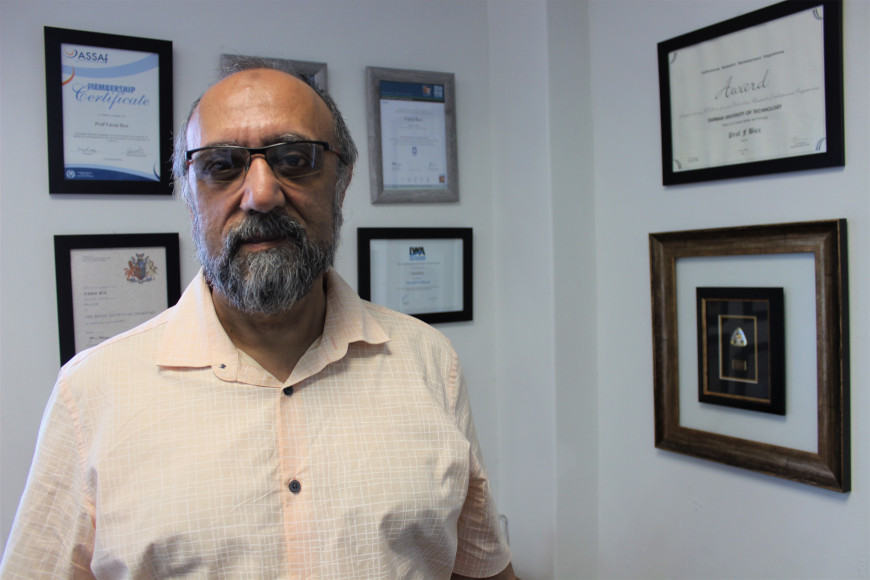DUT Communications team’s Waheeda Peters spoke to Professor Faizal Bux, the award-winning Director of the Institute for Water and Wastewater Technology (IWWT) and SARChI chair, at the Durban University of Technology (DUT) who has won numerous awards over the years for his research work. His primary research area has been in the field of wastewater treatment and beneficiation, with emphasis on identifying wastewater as a resource rather than a pollutant.
He has built a substantive track record gaining national and international accolades, and winning the prestigious ‘Oscar in Science’, NSTF-WRC award. He was also a finalist for the Lifetime award. He holds prominent positions internationally, including fellowships to the International Water Association (IWA) and the Royal Society of Chemistry (RSC), and serves as the chair for BRICS (Brazil, Russia, India, China, South Africa) network universities of the Integrated Technology Group (ITG) “Water resource management and pollution treatment”. Professor Bux has an extensive publication track record.
Over the last 25 years, he has established himself in his field both locally and internationally and has been very successful in securing key partnerships with collaborators. Prof Bux has been fortunate to develop his research profile and outputs from a small laboratory with little equipment at Natal Technikon to a world-class facility with a dedicated building that has well-equipped laboratories.
More recently, he clinched the prestigious Vice Chancellor’s Research Award at the 2020 DUT Staff Awards and Annual Research and Innovation Awards.
Criteria’s for the award being that the applicant be considered as a leader in his or her field, internationally and nationally; have a sustained record of distinguished scholarship and work; a high impact and visibility of research in his or her field; demonstrate outstanding capability and exceptional performance/achievements and provides significant value to the university and should have at least a C-NRF rating or equivalent recognition. Other nominees in this category were DUT’s Prof Krishnan Kanny from the Faculty of Engineering and the Built Environment and Prof Nirmala Dorasamy from the Faculty of Management Sciences.
“It feels good to be acknowledged by the university for my outputs and research. It’s paramount that we do good quality science so that it is recognised by our peers externally. I’m most certainly grateful to be recognised by my peers within the university community. Both Prof Kanny and Prof Dorasamy are well-respected in their own fields of research. I think the big plus on my side was the NSTF award that I got for research which is nationally recognised, ‘Oscars of Science’, that played a big role in me getting this award,” he said.
Besides the numerous accolades he has received, Prof Bux is also one of the top impact authors who has a H index rating of 45.
An h-index is a rough summary measure of a researcher’s productivity and impact. Productivity is quantified by the number of papers, and impact by the number of citations the researchers’ publications have received.
“I always maintain it’s not about producing publications and outputs for the sake of it or for personal or career progression, it’s about producing quality science that makes a difference. We benchmark our outputs with the very best in the world. We endeavour to publish our findings in high impact journals and therefore, many of our papers are highly cited which is a reflection of the valuable contribution of our manuscripts to the water sector.” he said.
“I have always allowed my post-graduate students to serve as first authors and publish in leading journals. By publishing in high impact journals also leads to improved citations in that way it improves the stature of the university in the international rating system,” he said.
Prof Bux relayed that the research conducted at IWWT is well embedded in terms of Envision 2030. “Our research fitted directly into Envision 2030 because our work is very much applied and it addresses community needs and societal imperatives, as well as is benchmarked globally. In addition to Envision 2030, research at Institute also addresses the Sustainable Development Goals (SDG) 6 and 7 with respect to provision clean water and sanitation and affordable and clean energy. We attract substantial external funding to support our projects and students,” he said.
Research at IWWT is not only about one individual but a multi-disciplinary team of scientists including post-doctoral fellows, research associates and researchers with expertise across the disciplines of wastewater, engineering, microbiology and molecular biology.
“We have state-of-the-art laboratories and equipment, to conduct high-level research allowing us to produce outputs benchmarked with the best in the world. I am proud to be part of the DUT community, and look forward to continuing to play a significant role in further establish the stature of the university both locally and globally,” he said.
Pictured: Professor Faizal Bux
Waheeda Peters


